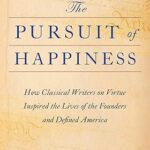(reviewed by JD Jung)
“Life, Liberty and the pursuit of Happiness” is a well-known phrase in the United States Declaration of Independence. But what did the “pursuit of Happiness” mean to the founding fathers? American legal scholar, Jeffrey Rosen uncovers what the “pursuit of Happiness” truly meant to them and others, offering a compelling exploration into their philosophical influences and personal struggles in his book, The Pursuit of Happiness: How Classical Writers on Virtue Inspired the Lives of the Founders and Defined America.
Many followed the Stoic philosophers. For most, it included constantly learning and practicing daily habits that lead to character improvement and growth. This included frugality, moderation, justice, keeping one’s emotions in check, and many other traits that were thought to be that of one with “good character”. Rosen delves in depth on the teachings on writers and philosophers, such as Cicero, Pythagoras, Socrates, and Plutarch (just to name a few).
What I particularly found fascinating was what certain founding fathers had to struggle with. For instance, John Adams realized that he had to work on vanity and controlling his emotions. Frugality was one that many had problems with. That included Thomas Jefferson, who seemed to lack self-awareness. Additionally. Jefferson not only refused to free his sales even after his death, but also berated the talents of Black poet Phillis Wheatley, whereas Franklin and Washington held her in high esteem. “Jefferson’s racism was jarring even by the standards of his time.”
Rosen not only profiles founding fathers, but others such as Wheatley, Abraham Lincoln, and Frederick Douglass and what the pursuit of happiness meant in their lives.
Rosen teases us briefly with conjecture on what the founding fathers might have thought of today’s populism, threats of mob rule, an extremely divided electorate, polarization in Congress, and pandering politicians. I would have liked to read more on this, but that’s a topic for another book.
The Pursuit of Happiness: How Classical Writers on Virtue Inspired the Lives of the Founders and Defined America ” will resonate with a niche audience interested in American history, philosophy, and political theory. Rosen’s meticulous research make it a valuable addition to any enthusiast’s library, offering profound insights into the foundational principles that continue to shape the American experience. As a member of this niche audience, I eagerly anticipate further explorations from Jeffrey Rosen.


